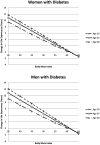Impact of bariatric surgery on life expectancy in severely obese patients with diabetes: a decision analysis
- PMID: 25844968
- PMCID: PMC4388039
- DOI: 10.1097/SLA.0000000000000907
Impact of bariatric surgery on life expectancy in severely obese patients with diabetes: a decision analysis
Abstract
Objective: To create a decision analytic model to estimate the balance between treatment risks and benefits for severely obese patients with diabetes.
Background: Bariatric surgery leads to many desirable metabolic changes, but long-term impact of bariatric surgery on life expectancy in patients with diabetes has not yet been quantified.
Methods: We developed a Markov state transition model with multiple Cox proportional hazards models and logistic regression models as inputs to compare bariatric surgery versus no surgical treatment for severely obese diabetic patients. The model is informed by data from 3 large cohorts: (1) 159,000 severely obese diabetic patients (4185 had bariatric surgery) from 3 HMO Research Network sites; (2) 23,000 subjects from the Nationwide Inpatient Sample; and (3) 18,000 subjects from the National Health Interview Survey linked to the National Death Index.
Results: In our main analyses, we found that a 45-year-old woman with diabetes and a body mass index (BMI) of 45 kg/m gained an additional 6.7 years of life expectancy with bariatric surgery (38.4 years with surgery vs 31.7 years without surgery). Sensitivity analyses revealed that the gain in life expectancy decreased with increasing BMI, until a BMI of 62 kg/m is reached, at which point nonsurgical treatment was associated with greater life expectancy. Similar results were seen for both men and women in all age groups.
Conclusions: For most severely obese patients with diabetes, bariatric surgery seems to improve life expectancy; however, surgery may reduce life expectancy for the super obese with BMIs over 62 kg/m.
Conflict of interest statement
Conflicts of Interests: No conflicts of interest to declare.
Figures



Comment in
-
Impact of Bariatric Surgery on Life Expectancy in Severely Obese Patients With Diabetes.Ann Surg. 2017 Dec;266(6):e57. doi: 10.1097/SLA.0000000000001356. Ann Surg. 2017. PMID: 29136968 No abstract available.
-
Impact of Bariatric Surgery on Life Expectancy in Severely Obese Patients With Diabetes.Ann Surg. 2017 Dec;266(6):e57-e58. doi: 10.1097/SLA.0000000000001398. Ann Surg. 2017. PMID: 29136969 No abstract available.
References
-
- National diabetes fact sheet: national estimates and general information on diabetes and prediabetes in the United States. Atlanta, GA: U.S. Department of Health and Human Services, Centers for Disease Control and Prevention, 2011; 2011. Centers for Disease Control and Prevention.
-
- Ogden CL, Carroll MD, Kit BK, Flegal KM. Prevalence of obesity in the United States, 2009-2010. Hyattsville, MD; National Center for Health Statistics; 2012. NCHS data brief, no 82.
-
- Mokdad AH, Ford ES, Bowman BA, et al. Prevalence of obesity, diabetes, and obesity-related health risk factors, 2001. JAMA. 2003;289:76–9. - PubMed
-
- Colquitt JL, Picot J, Loveman E, et al. Surgery for obesity. Cochrane Database Syst Rev. 2009:CD003641. - PubMed
-
- Buchwald H, Estok R, Fahrbach K, et al. Weight and type 2 diabetes after bariatric surgery: systematic review and meta-analysis. Am J Med. 2009;122:248–56. e5. - PubMed

